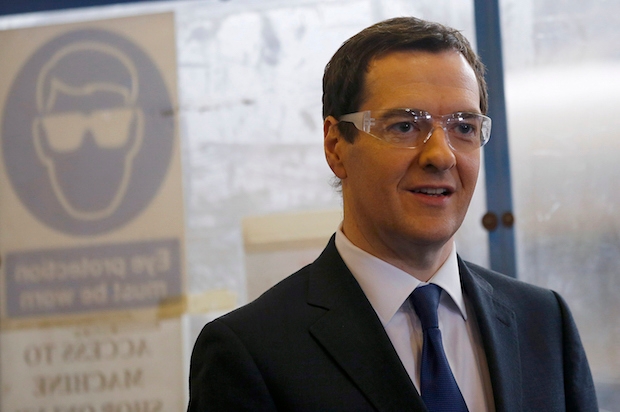George Osborne is making his first big move as Chancellor in this Parliament. In his Mansion House speech tonight, he will announce a ‘new settlement’ for the economy: a permanent commitment to running budget surpluses in normal times. Osborne will point to the Tories’ election victory as the mandate to enshrine this commitment in law:
‘The result of this recent British election – and the comprehensive rejection of those who argued for more borrowing and more spending – gives our nation the chance to entrench a new settlement.
‘In the budget we will bring forward this strong new fiscal framework to entrench this permanent commitment to that surplus, and the budget responsibility it represents. This fiscal framework will be voted on by the House of Commons later this year, and assessed by the Office for Budget Responsibility we created.’
What is Osborne up to? This will undoubtedly be a contentious move, with his opponents likely to label him as an ideologue obsessed with cutting debt. The Guardian has even characterised Osborne as Mr Micawber on their splash today, describing his new settlement as a return to Victorian-style finances.
Wednesday's Guardian front page:
Osborne turns to ‘Micawber’ economics#tomorrowspaperstoday #bbcpapers pic.twitter.com/r1K5tjWDdr— Nick Sutton (@suttonnick) June 9, 2015
In reality though, this is political manoeuvring from the Chancellor. After failing to meet his initial targets on debt reduction during the last parliament, he has decided again to put it front and centre of this government’s agenda. The law itself might be ceremonial but it does hint at his determination to clear the deficit. On the Today programme, former Chancellor Nigel Lawson said ‘it’s new certainly to legislate for this, but it’s not new to have this doctrine’, pointing to his time in office during 1980s:
‘Over the economic cycle as a whole, there should be no deficit at all. There will be deficits in times of recession and surpluses in time of a boom, because the cycle as a whole can’t be eliminated, there will always be a cycle.’
If one of Osborne’s motivations is to show he is serious about cutting debt, the other is to cause problems for the opposition. Lawson went on to explain that the new law has a political and economic edge:
‘He is a responsible Chancellor and I’m sure he would do this if even there were no legislation. But he is partly politically — partly putting the Labour party on the spot: how are they going to react to this and what arguments are they going to use. But also, I think he wants to put a straitjacket for future chancellors who might not be as responsible as he is.’
We will no doubt hear from Labour at PMQs today on how they will respond to this plan. But given that a lack of fiscal responsibility was one of the major factors that sunk Ed Miliband’s chances of becoming Prime Minister, they have a careful line to tread. Attacking the policy will allow the Tories to say it’s ‘same old Labour’ who don’t care about the safety of public finances and can’t be trusted with the economy.
But signing up to this bill will cause problems with the left of the party, who will be opposed to the fiscal prudence the government will attempt to put into law. This is a quandary George Osborne will have taken great delight in creating, once again showing he is a political strategist first, Chancellor second.






Comments